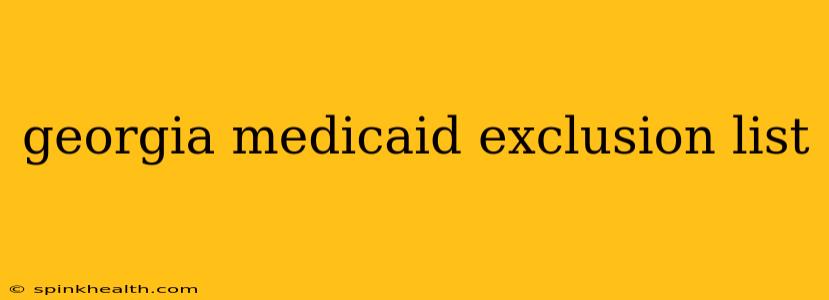Navigating the Georgia Medicaid Exclusion List: A Comprehensive Guide
The Georgia Medicaid Exclusion List is a crucial resource for healthcare providers, ensuring the integrity of the state's Medicaid program. It's a dynamic database, constantly updated, reflecting providers who have been excluded from participation due to various reasons. Understanding this list is vital for both providers seeking to participate and those already involved in the program. This guide will unravel the complexities of the Georgia Medicaid Exclusion List, answering common questions and providing valuable insights.
What is the Georgia Medicaid Exclusion List?
The Georgia Medicaid Exclusion List is a publicly accessible database maintained by the state. It contains the names and identifying information of individuals and entities barred from participating in the Georgia Medicaid program. Exclusion can stem from various reasons, including fraud, abuse, criminal convictions, or failure to comply with program rules. Think of it as a safeguard against those who might exploit the system, protecting both taxpayer dollars and the well-being of Medicaid recipients.
How is someone added to the Georgia Medicaid Exclusion List?
The addition to the list isn't arbitrary. There's a formal process involving investigations, hearings, and due process. Reasons for exclusion can range from serious offenses like Medicare or Medicaid fraud to less severe infractions like repeated violations of program rules or failing to meet specific compliance requirements. The state employs rigorous auditing and investigation procedures to identify potential issues and ensures fairness in the exclusion process.
How can I check if someone is on the Georgia Medicaid Exclusion List?
The Georgia Department of Community Health (DCH) typically makes the exclusion list publicly available online through their website. This accessibility fosters transparency and allows anyone – including patients, other healthcare providers, and employers – to verify the participation status of a provider. The process is usually straightforward, requiring you to search by name or other identifying information.
What are the consequences of employing someone on the Georgia Medicaid Exclusion List?
Employing someone on the exclusion list carries significant repercussions. It can lead to sanctions against the employing entity, including fines, termination of Medicaid contracts, and even criminal charges. It underscores the seriousness of adhering to the regulations and underscores the importance of performing thorough background checks before hiring any healthcare professional intending to bill Medicaid.
How long does someone remain on the Georgia Medicaid Exclusion List?
The duration of exclusion varies widely depending on the nature and severity of the violation. Some exclusions may be temporary, while others are permanent. The length of exclusion is determined by the state, taking into account the specifics of the case and any mitigating circumstances.
Can someone appeal their exclusion from the Georgia Medicaid Exclusion List?
Yes, individuals and entities placed on the exclusion list typically have the right to appeal the decision. The appeals process involves presenting evidence and arguments challenging the exclusion. This process offers a crucial avenue for those who believe the exclusion was unwarranted or based on erroneous information.
Where can I find more information about the Georgia Medicaid Exclusion List?
The most authoritative source of information is the official website of the Georgia Department of Community Health (DCH). Their site should provide details about the exclusion list, the process of checking its status, appeals procedures, and general information regarding Medicaid compliance.
In conclusion, the Georgia Medicaid Exclusion List plays a vital role in upholding the integrity of the state's Medicaid program. Understanding its purpose, access methods, and consequences is crucial for all stakeholders involved in the healthcare system. By adhering to regulations and utilizing the available resources, we contribute to a fairer and more effective healthcare system for all Georgians.

